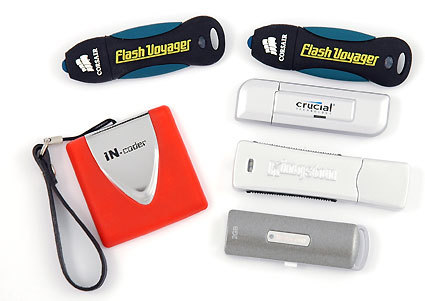Data Transfer on the Run: High-Speed USB Flash Drives
Get Tom's Hardware's best news and in-depth reviews, straight to your inbox.
You are now subscribed
Your newsletter sign-up was successful
Comparing High Speed USB Flash Drives
Thinking about what was involved in moving data between two locations ten years ago, all one can do is grin ruefully. In those days, convention called for 3.5" floppy disks, because CD burners weren't widely available. Iomega's ZIP drive was an option, but not everyone had a drive, and they worked only on the slow parallel port or through SCSI connections. Streaming tape drives require support from backup software, so they also proved impractical. Another option might have been to carry a hard drive along, somewhat impractical even to this day.
Price drops in CDs and DVDs have made read/write optical media the indirect successor to floppies, both for physical data delivery and backups. But, as always, the recording surfaces on these silvery plastic disks remain sensitive; a scratch or a speck of dust can damage key bits of data.
Today, though, there is a new option. The increasing storage capacities of small, convenient Flash memory cards, combined with broad support for USB ports in most PCs, means so-called Flash drives or pen drives represent a great value. Today's Flash drives are smaller than a typical cigarette lighter and offer capacities of up to 4 GB, with 8 GB capacities on the way, and the promise of still larger drives in the future.
These drives will work with both USB 1.1 and USB 2.0. In some cases, the faster USB 2.0 interface isn't even strictly necessary for such devices. Though USB 2.0 supports data transfer rates of slightly better than 30 MB/sec, modern Flash memory chips can't yet match those speeds. On the other hand, devices that conform to the USB 1.1 specification - which tops out at about 1 MB/sec data transfer - leave a lot to be desired, though they do work (if slowly).
We looked around at the current USB Flash drive product offerings on the market, and decided to put a handful of products from well-known vendors through their paces. Because we decided to focus on high-speed Flash drives, we also decided to cover only devices with 1 GB or more of storage capacity. Our thinking was that devices smaller than that could be considered short of capacity in just a few months - we generally recommend no Flash drives smaller than 256 MB these days.
One of our test subjects is a little different from the others, however: the In.Coder PJ-28's 1" hard disk offers sufficient capacity with 2.2 GB of storage, but is really too slow to qualify as a high-speed device of this kind.
Get Tom's Hardware's best news and in-depth reviews, straight to your inbox.
Current page: Comparing High Speed USB Flash Drives
Next Page Corsair Flash Voyager
Patrick Schmid was the editor-in-chief for Tom's Hardware from 2005 to 2006. He wrote numerous articles on a wide range of hardware topics, including storage, CPUs, and system builds.
